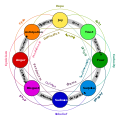References
- 1 2 William Fleming (1890). "Vocabulary of Philosophy: Moral, Ethical, Metaphysical". TORRE DE BABEL EDICIONES Philosophy, Psychology and Humanities Web Site. Archived from the original on 26 January 2021. Retrieved 3 January 2015.
{{cite web}}: CS1 maint: numeric names: authors list (link) - 1 2 Alexander, Chester. (1946a). Antipathy and Phobia. Sociometry, 9 (2/3), 226-232.
- 1 2 Alexander, Chester. (1946b). Antipathy and Social Behavior. The American Journal of Sociology, 51 (4), 288-292.
- 1 2 Bryant, Sophie. (1895). Antipathy and Sympathy. Mind, 4 (15), pp. 365-370.

